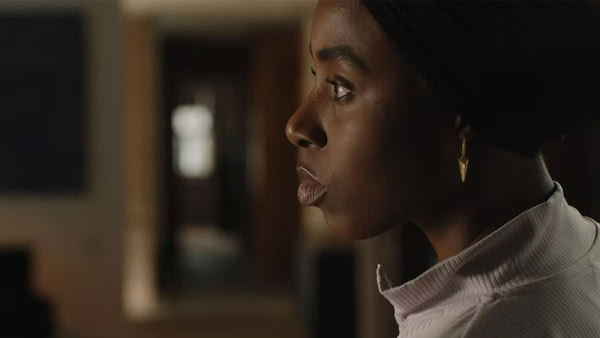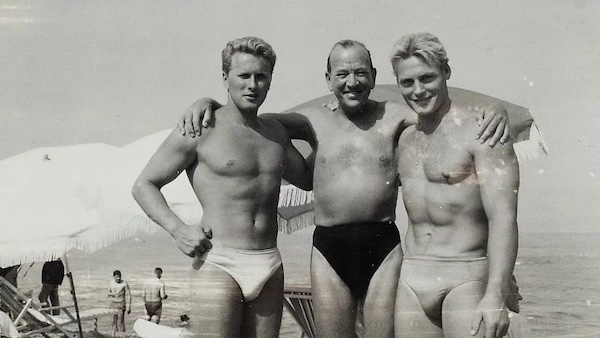Film Reviews: Provincetown Film Festival 2024 — Where’s the Box Office?
By Gerald Peary
At this year’s festival: the Best Film of 2024, “We Strangers,” and a slew of gossipy docs on show business celebrities.
The buzz and excitement around this year’s trans favorite, I Saw the TV Glow, is an exception. For all purposes, the American independent cinema, both features and documentaries, is dead, dead, dead at the theater. Few young people will pay to see small films, and older folks watch everything at home. Where’s the box office?

Kirby in a scene from We Strangers. Photo: South by Southwest
That’s my only explanation of why We Strangers, which I saw recently at the 26th Provincetown Film Festival, has yet to secure distribution, even after its successful March premiere at South by Southwest. Where’s the box office? It’s far and away the Best Film of 2024, superior to anything that has come out of Hollywood. This first feature from Indian American Anu Valia was shot in her home town of Gary, Indiana, and, in an acerbic way, it’s an instant regional classic. It’s about a young African American woman, Rayelle, who is hired to clean one house in a wealthy Gary neighborhood, then another, and she’s soon eavesdropping on marital intrigues, confided to by ditsy eccentrics, pressured to care for an entitled teenager. Playing her own head games, she convinces her gullible employers that she’s clairvoyant. Those who dote on Rayelle are turned on and energized by her Otherness…. Until they’re not. We Strangers is a scathing, daemonic attack on white-skin privilege and the enfeebled morality of the bourgeoisie family. Formally adventurous, Valia’s film achieves at its height a surreal Buñuelian intensity. And it actually has important things to say about race, class, today’s askew America.
One of the producers of We Strangers introduced it at Provincetown, and she has hopes that it will get into the world. The talented star, Kirby, is making a name for herself with many TV roles, and maybe Kirby’s growing recognition will prompt a distributor to take a chance. Just maybe.
The best of luck.
Meanwhile, one exception to the demise of independent cinema are documentaries that focus on show business celebrities. Cable sales are practically guaranteed. Who isn’t a sucker for this breezy, gossipy subgenre? The Provincetown Film Festival shrewdly took advantage of the many celeb bio-docs available and handpicked those that fit into its commitment to a heavily LGTBQ agenda. I saw documentaries, the majority of them excellent, about gay men (Ishmael Merchant, James Ivory, Noel Coward), a maybe gay man (Luther Vandross), a bi woman (Ani DeFranco), and a wobbly straight woman (Liza Minnelli) who is the ultimate gay icon.

Noel Coward (center) and friends on the beach in a scene from Mad About the Boy: the Noel Coward Story.
My very favorite of the bunch was Mad About the Boy: the Noel Coward Story. I knew nothing of the fascinating life of this blue-collar Brit who dropped out of school at age nine, obsessively worked his way up in the theater world as an actor and playwright, and emerged convincingly reinvented as an upper-class twit and wit, a darling of royalty and high society. He’s great on the talk shows we see in this film, droll and truly funny. But his period of being feted on television parallels his collapse as a playwright: a dozen failures in a row over 25 years followed his international triumph in 1941 with Blithe Spirit. Anyway, I easily forgive Coward because of his dizzy campy acting in Boom! (1968) and the behind-the-scenes on two sublime films: his screwball play adapted to the screen for Ernst Lubitsch’s dazzling Design for Living (1933), and Coward’s tender, delicate screenplay for the tragic romance, Brief Encounter (1945).
Curiously, Coward never came out in his 73 years of life, but who in the don’t ask/don’t tell world doubted that he was homosexual? The documentary shows him at home with several long-term boyfriends. But there’s no confirmation of the sexuality of the late R&B singer Luther Vandross in Luther: Never Too Much. He certainly seems queer, he who lived always with his mother and who spoke in obviously coded language about how painful that he could never find true love. (Translation: if he really found true love, his African-American fan base would desert him, his dear mom would keel over.) My judgment of this documentary? Good, not great, better on showcasing Vandross’s lovely singing than telling his life.
Much better is Merchant Ivory, Stephen Soucy’s affectionate portrait of the directing-producing team behind Room With a View (1985), Howard’s End (1992), Remains of the Day (1993), and many other classy, intelligent costume pictures. The surprise here was all the backstage drama behind these seemingly sedate movies. The chaos was mostly caused by Ishmael Merchant’s roguish attempts to slash actor and crew salaries or put films into production before the money had been properly raised. Merchant was, undeniably, a scoundrel though an immensely charming one. If he put off paying his star actors, he rewarded them instead with his lavish home-cooked dinners.
Yes, Merchant and Ivory were lovers, and, we find out, bickering ones. And unfaithful ones. Merchant is deceased, but Ivory in his 80s is alive, openly queer, and filled with ripe stories, some of which he was willing to share for the camera. With a twinkle in his eye.

Ani DeFranco in scene from 1-800-On-Your-Own. Photo: Tribeca
My wife grew up adulating Ani DeFranco. Though I respect the intensity of her fandom, DeFranco’s didactic female-empowerment music doesn’t register for me. But she’s a complicated, absorbing person who held my attention completely in 1-800-On-Your-Own. She’s made quite a transformation from the defiant, whirling dervish bisexual role model of her 20s. Now, just past 50, DeFranco is facing menopause, and she’s held often in place by two daughters and a husband with whom she has an “oil and water” relationship and whom she struggles with in couples therapy. Living these days in New Orleans, she — humbled, maybe beaten down a bit — periodically takes to the road with her guitar. We see DeFranco valiant but lonely, feeling free and also guilty away from family, riding a train to her gig in Alaska.
Last bio but least, a far too worshipful saga of Liza Minnelli, which title, like its hero, is way over the top: Liza: A Truly Terrific Absolutely True Story. Well, not quite. Here’s a parade of people who all love Liza and proclaim her a great singer, a splendid entertainer, a fabulous person, and the best friend one could have in the world. Her only fault seemed to be her inability to detect that several of the men she married were flagrantly homosexual. Otherwise: Liza, who we see is in failing health, is Truly Terrific Absolutely. Someone I know well came up with an unapologetically non-PC term for this kind of bio on its knees: a “fagiography.”
Gerald Peary is a Professor Emeritus at Suffolk University, Boston; ex-curator of the Boston University Cinematheque. A critic for the late Boston Phoenix, he is the author of nine books on cinema; writer-director of the documentaries For the Love of Movies: The Story of American Film Criticism and Archie’s Betty; and a featured actor in the 2013 independent narrative Computer Chess. His latest feature documentary, The Rabbi Goes West, co-directed by Amy Geller, has played at film festivals around the world. His latest book, Mavericks: Interviews with the World’s Iconoclast Filmmakers, has been published by the University Press of Kentucky.
Tagged: "1-800-On-Your-Own", "Mad About the Boy: the Noel Coward Story", "Merchant Ivory", "We Strangers", Ani DeFranco, Anu Valia, Dana Flor, Liza Minnelli, Luther Vandross, Luther: Never Too Much", Noel-Coward, Provincetown Film Festival, Provincetown Film Festival 2024

…Where Are The Terrific Independent Films In 2024. Actually, Where Are Any Terrific Films, In 2024. Terrific Being Super Interesting Subject Matter, Extremely Well Directed, Well Acted. I Love To Go To The Movies. There Is A Bunch Of Junk Out
There. Looking Forward To “We Strangers” If It Ever Gets Distribution. Can You Name Any Terrific, By My Criteria, Movies That Are Currently Out For Public View. [DYING FOR A GOOD MOVIE}